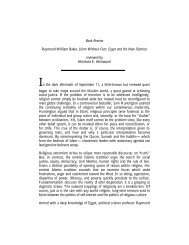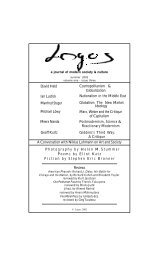Michael J. Thompson Stephen Eric Bronner Wadood Hamad - Logos
Michael J. Thompson Stephen Eric Bronner Wadood Hamad - Logos
Michael J. Thompson Stephen Eric Bronner Wadood Hamad - Logos
Create successful ePaper yourself
Turn your PDF publications into a flip-book with our unique Google optimized e-Paper software.
Abbas Amanat<br />
The people are not monkeys who merely imitate. The pupil<br />
understands and then acts, and then tries to expand his own<br />
understanding, so someday he will not need the teacher. He<br />
can himself directly look up (the sources) and deduct and<br />
form an opinion. The relationship that the traditional<br />
institution (i.e. the clerical establishment) seeks is one of<br />
master and the follower; the master remains master and the<br />
follower remains follower. Forever these shackles straps<br />
around his neck. The relationship of the (real) scholar (`alim )<br />
with people is a critical one. Since he has expert knowledge,<br />
we listen to him as a scholar. Whenever we find something<br />
objectionable, we criticize, we debate. He is not a saintly<br />
celestial being to be treated by us as a divine figure. Of course<br />
this class (i.e. the clergy) first turned the infallible (Shi`ite)<br />
Imams to divine figures so that they themselves could pose as<br />
divine representatives of the Imams. 1<br />
Such critique of the abiding authority of ijtihad and that of the so-called<br />
“source of emulation” (marja’-i taqlid) inevitably bring to light the much<br />
debated issue of legal authority in Shi’ite Islam and, more specifically, the<br />
problem of institutionalization of ijtihad. He obviously does not address<br />
openly the wilayat-i faqih, but his reference to the “imam” in the above<br />
passage, as in other allusions sprinkled throughout his speech, signifies the<br />
obvious to his sensitive audience. He deliberately seems to have touched on a<br />
sore point since the doctrine of the “guardianship of the jurists,” it can be<br />
argued, stands on shaky legal grounds. Shi’ism never historically or<br />
institutionally made the necessary leap from the loosely defined ijtihad to a<br />
centralized marja’iya, let alone ever develop the theoretical ground for<br />
creating a universal judicial authority.<br />
Before the time of Ayatollah Khomeini, Shi’i legal thought never did<br />
seriously engage in the sphere of public law and consequently never<br />
articulated a coherent theory of government. Even in the safety of the<br />
madrasa, Shi’ite law remained entirely preoccupied with the articulation of<br />
civil and private law as practiced in the mujtahid-run civil courts. Such<br />
practice of ijtihad was never systematized or subjected to clear and universally<br />
accepted norms, one may venture to say, almost by choice. The Shi’ite law on<br />
which the mujtahids relied remained a matter of interpretation and scholastic<br />
scrutiny largely within the madrasa environment rather than through the<br />
<strong>Logos</strong> 2.3 – Summer 2003




